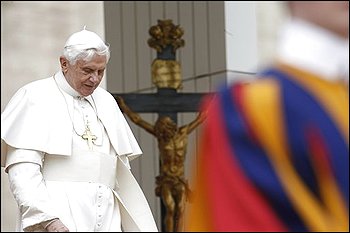By Michelle Boorstein
Washington Post
April 16, 2010
http://www.washingtonpost.com/wp-dyn/content/article/2010/04/15/AR2010041502491.html
 |
| Pope Benedict XVI walks away as a Swiss guard stands in foreground, following his weekly general audience, in St. Peter's Square at the Vatican, Wednesday, April 14, 2010. The Vatican has gone into full-fledged damage control mode in the priest sex abuse scandal ahead of Pope Benedict XVI's first foreign trip since it erupted. Officials are promising surprising new initiatives. The pope's personal secretary is speaking out. And bishops around the world are being told to report abuse cases to the police. The revved-up strategy comes as the Vatican tries to stem the damage from weeks of revelations about priests who raped and molested children, and the church officials who kept it quiet _ before the pontiff's visit to Malta this weekend. Abuse victims on that majority Roman Catholic Mediterranean island are seeking a papal audience and apology. Photo by Pier Paolo Cito |
For the first time, American Catholic bishops have begun tracking complaints of sexual abuse against foreign-trained priests working in this country, raising questions about the screening process in place in U.S. dioceses.
In the U.S. bishops' most recent annual survey, church officials reported that of the 21 clergy sex abuse complaints made in 2009 by minors, nine involved priests sent by overseas dioceses. The information comes when the U.S. church is importing hundreds of priests and has been under intense scrutiny for its handling of sex abuse cases, including the movement of abusers from one country to another.
Though it's only one year of data and does not include details about any of the cases, the number of accusations involving foreign-trained priests has prompted debate within the church and among advocates for victims.
Are American dioceses stringent enough in screening priests who come from parts of the world where abuse might be less likely to be reported and background checks less coordinated? Where the definition of sex crimes and the attitude toward pre-ordination psychological testing might be different? Could the complaints sometimes be cultural misunderstandings?
Regardless, U.S. bishops are paying more attention to the subject, and for the first time required dioceses in 2008 to spell out what screening procedures they have in place for foreign priests. It did same last year.
Any original material on these pages is copyright © BishopAccountability.org 2004. Reproduce freely with attribution.